Timeless Tastes & Heritage Flavors
FOOD & BEVERAGE
In recent years, there has been a significant resurgence in the appreciation of traditional and culturally rich cuisines. Dishes and ingredients deeply rooted in heritage are captivating the palates of consumers worldwide, reflecting a collective desire to reconnect with authentic flavors and culinary traditions.

Nextatlas is at the vanguard of trend forecasting for the food and beverage sector. We've informed Barilla's marketing strategies and created a Foresight Trend Research platform for Mondelez's research. Our reputation as experts in the field also earned us a position as a research contributor to the Mondelez State of Snacking report alongside partners from the Food Institute, Euromonitor, Kantar, and Mintel. This blog details one of many food and beverage trends we publish on our platform every week.
The Rise of Heritage Flavors
Consumers are increasingly gravitating towards foods that offer a sense of history and authenticity. This phenomenon, which we refer to as the revival of "heritage flavors," encompasses the rediscovery and celebration of time-honored recipes and indigenous ingredients that have been passed down through generations.
In recent times, several factors have contributed to this trend. The growing consumer interest in bold, global flavors has led to a heightened appreciation for diverse culinary traditions. Nostalgia has also played a role, with many seeking comfort in familiar tastes that evoke fond memories.
Additionally, the incorporation of heritage-inspired cuisines into modern dining experiences has fostered a deeper connection to cultural roots. These elements have collectively fueled the resurgence of heritage flavors, enriching the contemporary culinary landscape.

Credits: coca-cola.com
Heirloom Recipes and Family Traditions: Nostalgia
In times of uncertainty, people gravitate towards familiar and comforting foods. Nostalgic flavors evoke comforting memories, prompting consumers to seek out foods that remind them of simpler times. This craving for comfort is visible in the resurgence of classic flavors and traditional dishes, where people find not just nourishment, but emotional satisfaction. Coca-Cola's release of an Orange Cream flavor, blending classic cola with orange and vanilla notes reminiscent of creamsicles, is a perfect example. Similarly, brown sugar has been highlighted as the flavor of the year for 2025, reflecting a return to familiar, comforting tastes.

A view of related insights from the Nextatlas platform (screenshots taken in March 2025)
Heirloom recipes, passed down through generations, are experiencing a revival, transforming meals into emotionally nourishing experiences that connect individuals to their cultural roots. Family recipes are being cherished and recreated, reflecting a predicted 46% growth in interest over the next year. This goes beyond just enjoying a good meal—it’s about deepening our connection to the people and cultures that shaped our culinary traditions. The act of preparing and sharing these meals is about keeping traditions alive, building memories, and finding comfort in the familiar.
Together, these trends underscore the powerful role food plays in our lives—not only as fuel, but as a source of comfort, connection, and nostalgia. Deepening connection to heritage and shared memories through food help us stay grounded in difficult times while also supporting our ongoing journey toward well-being.
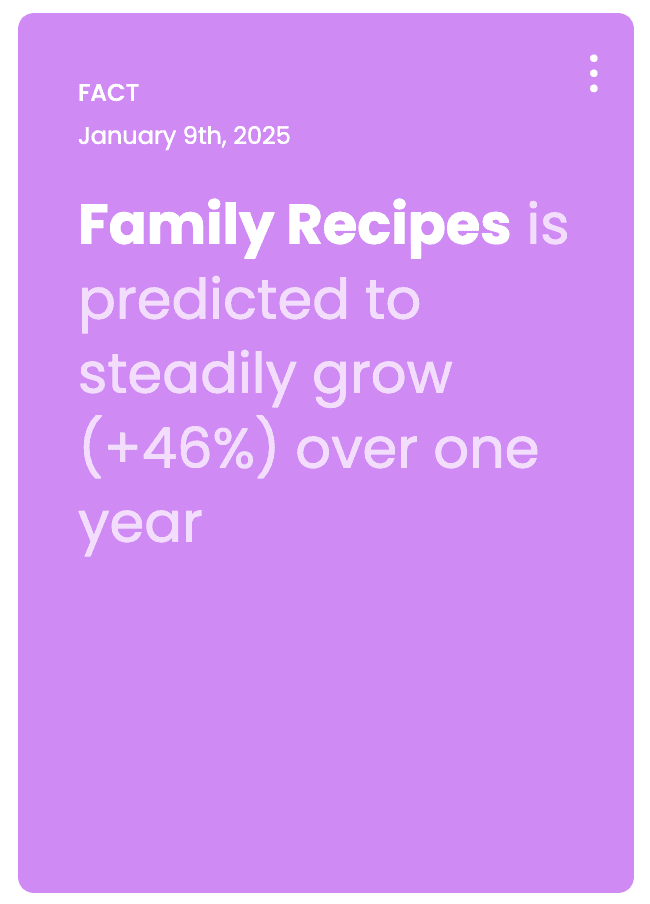
Related fact from the Nextatlas platform (screenshot taken in March 2025)
Revival of Traditional Ingredients
In recent years, there has been a notable resurgence in the use of traditional ingredients across various cuisines, reflecting a broader trend of reconnecting with cultural roots through food items crafted with classical ingredients and methods. Long-established elements like perilla, a nutrient-rich herb with bold flavors, are being rediscovered and incorporated into modern dishes.
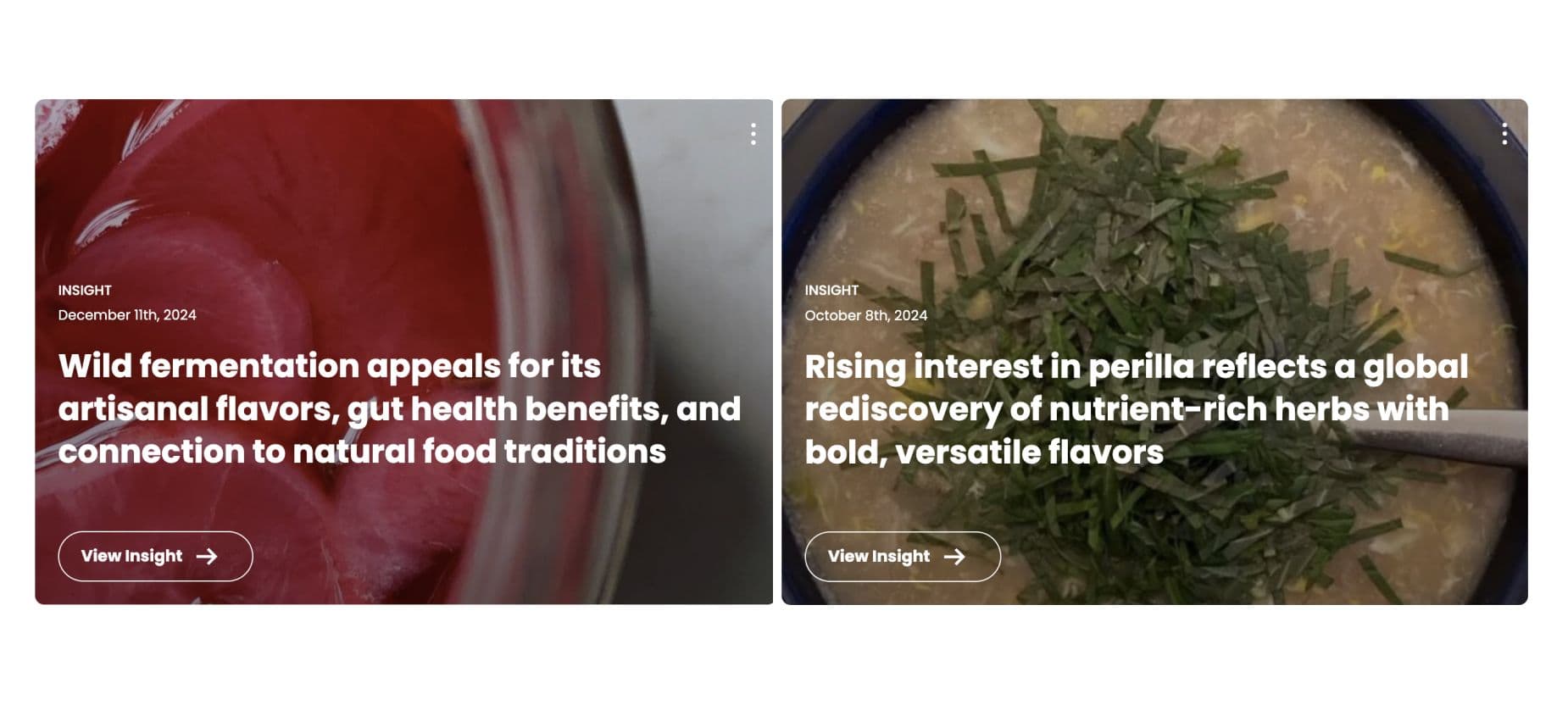
A view of related insights from the Nextatlas platform (screenshots taken in March 2025)
Traditional fermented foods such as kimchi and sauerkraut are experiencing renewed interest among Gen Z due to their affordability, bold flavors, and probiotic benefits. Staple items like pickles, olives, and tinned fish have transcended their traditional roles, becoming trendy and sophisticated choices. This shift is exemplified by the popularity of brands like Fishwife, known for its vibrant packaging.
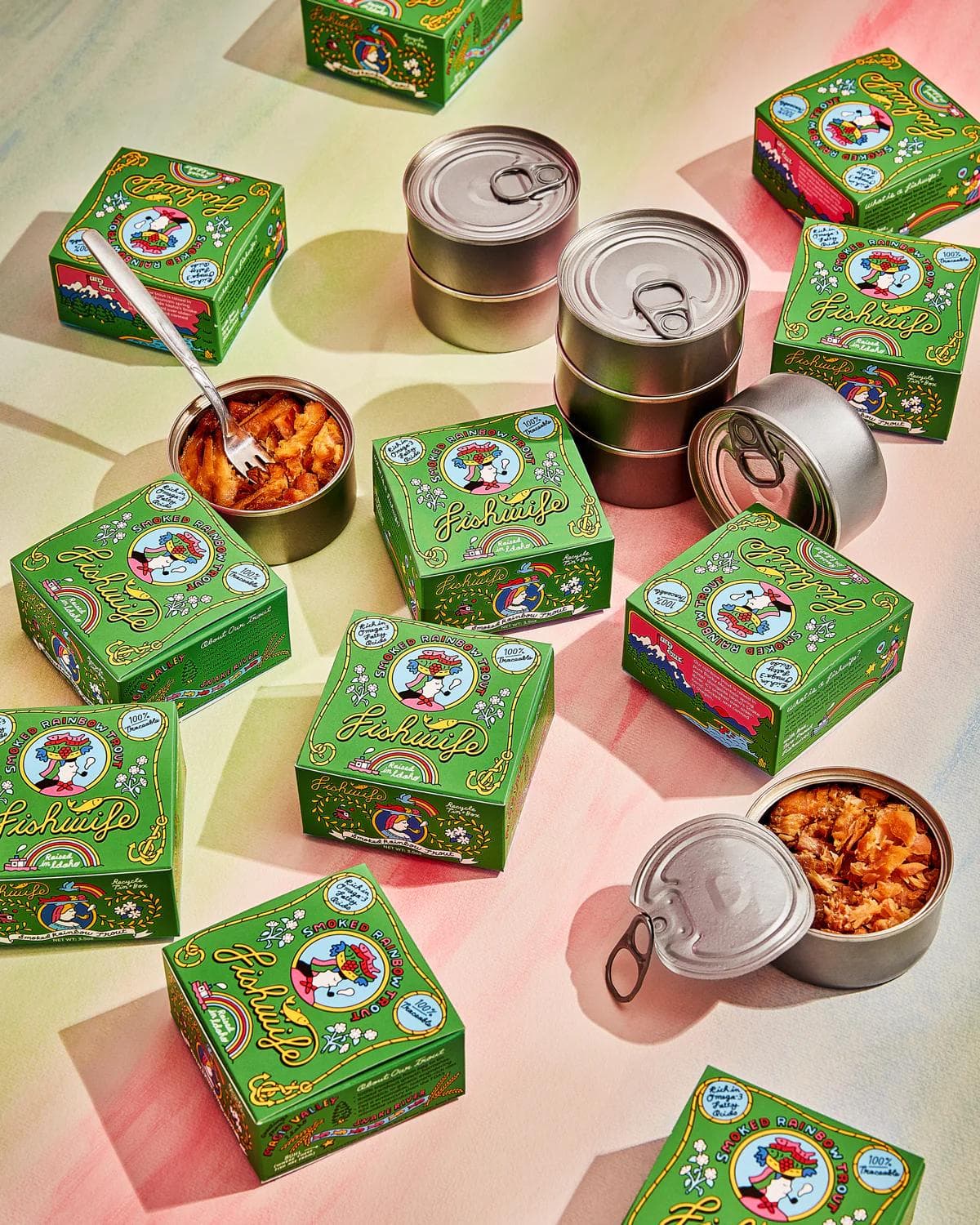
Credit: eatfishwife.com
The fermentation process enhances the nutritional profile of these foods, supporting gut health and digestion. Gut health’s rise as a major trend in recent times, partnered with this move towards embracing traditional ingredients that offer cultural authenticity, nutritional benefits and unique taste profiles, has created the perfect situation for these types of simple, time-honoured ingredients to come to the fore.
Hawaij, a traditional Yemeni spice blend typically comprising ginger, cardamom, turmeric, and black pepper, has gained popularity for its warm, earthy flavor and potential health benefits. Its anti-inflammatory properties make it a valuable addition to various dishes, aligning with the growing consumer interest in functional foods.

A view of related facts from early adopter conversations on the Nextatlas platform (screenshots taken in March 2025)
Global Culinary Exploration
As the world becomes more interconnected, the global palate has expanded. This exposure fosters a curiosity to explore and appreciate traditional dishes from various cultures, leading to a broader acceptance and incorporation of exploring bold, authentic flavors from various cultures.
This curiosity has led to a surge in popularity for dishes and ingredients that offer a genuine taste of their origins, such as Heinz's introduction of globally inspired sauces, such as Mexican Street Corn and Korean Sweet & Tangy BBQ.

Credits: Food & Wine / Kraft Heinz, Inc.
The burgeoning interest in exploring diverse culinary traditions is clear from the 34% increase in culinary exploration observed over the past year among our early adopters’ conversations. This curiosity extends to regional Chinese cuisines, such as Cantonese, where a growing appreciation for its delicate flavors and techniques is evident from our early adopter conversations.
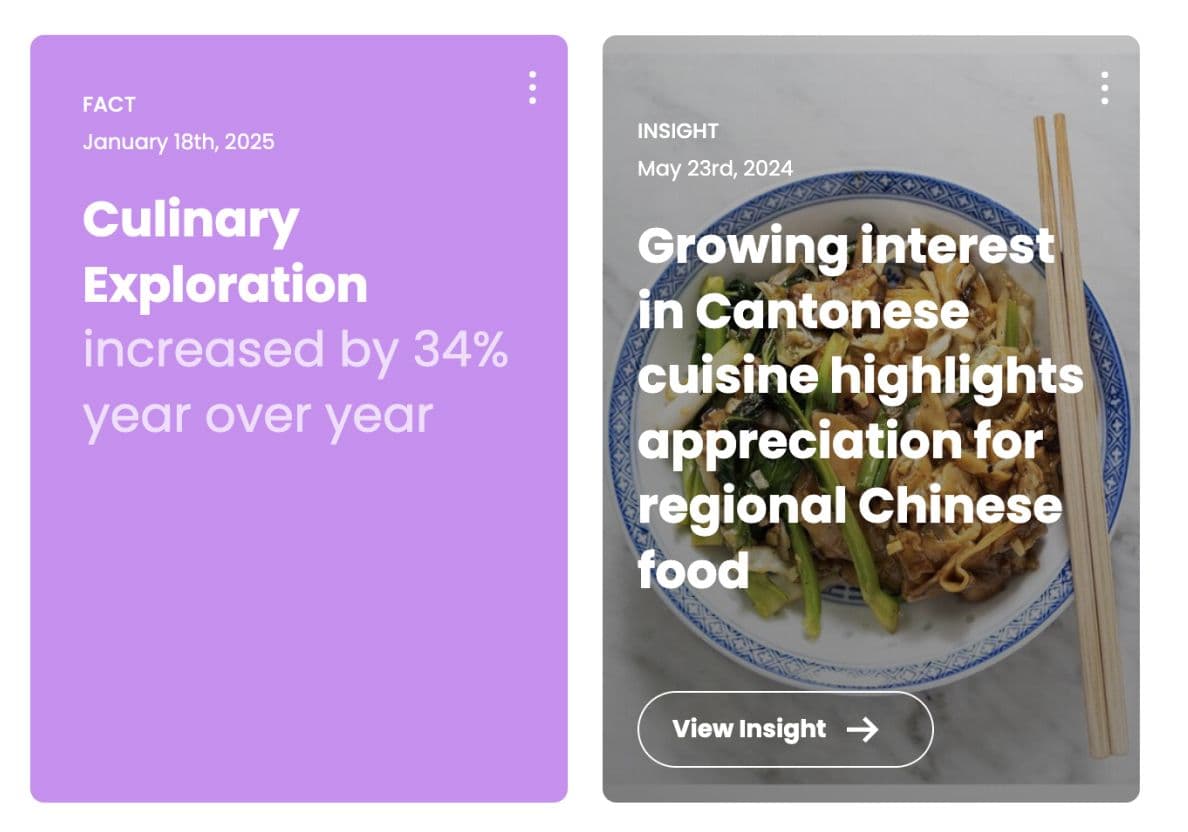
A view of a related fact and insight on the Nextatlas platform (screenshots taken in March 2025)
Similarly, Mexican cuisine is flourishing globally, driven by a rising appetite for complex, heritage-rich flavors. The ancient Mesoamerican farming technique called milpa, which involves growing maize, beans, and pumpkins together, is integral to Mexican cuisine. Chefs like Alex Henry and Alan Carias are incorporating milpa into their dishes, highlighting its sustainability and versatility. This practice not only preserves traditional agricultural methods but also enriches the culinary landscape with authentic flavors.
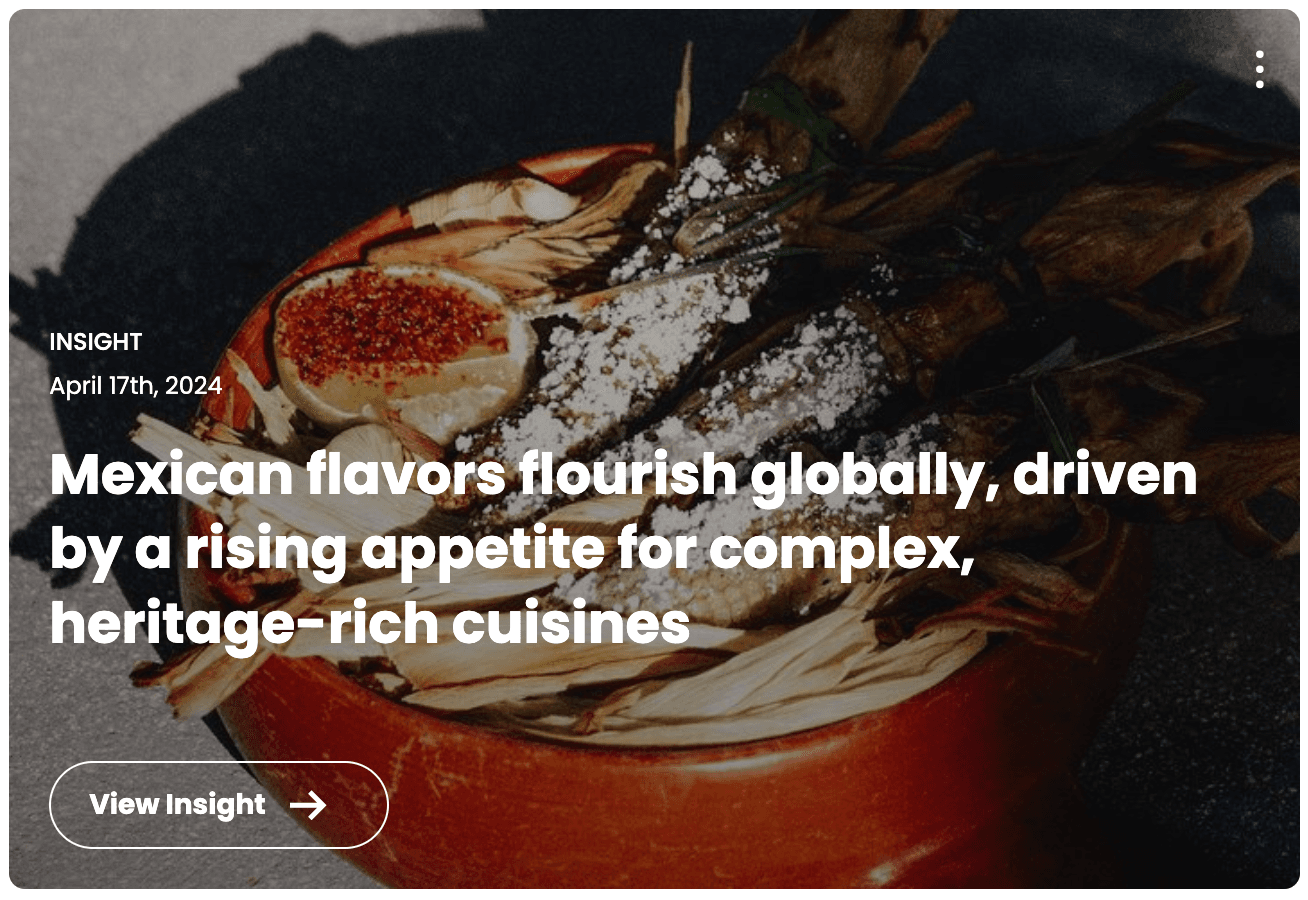
A view of a related insight on the Nextatlas platform (screenshot taken in March 2025)
Trending Ingredients from Nextatlas
This trend is also evident in the growing popularity of certain traditional ingredients that tell a story of cultural heritage.
- Bak Kut Teh: This traditional pork rib soup from Southeast Asia is experiencing a remarkable resurgence, with our prediction indicating a 97% growth over the past year. Its rich broth, infused with a blend of herbs and spices, offers a comforting taste of Malaysian and Singaporean culinary heritage.
- Mirin: The increasing global interest in Mirin, a sweet Japanese rice wine, underscores a universal craving for depth and authenticity in flavors. Its subtle sweetness and umami characteristics enhance a variety of dishes, reflecting the nuanced simplicity of Japanese cuisine.
- Gochugaru: This Korean red chili powder, known for its vibrant color and moderate heat, is predicted to increase +71% in popularity over the next year. Its use in dishes like kimchi highlights a global rediscovery of bold, versatile flavors inherent in Korean culinary traditions.

A view of related facts and insights on the Nextatlas platform (screenshots taken in March 2025)
The Role of Food in Cultural Connection
Food has emerged as a powerful medium to show respect for diverse cultures and traditions. Consumers are increasingly exploring food history to connect with their heritage, leading to a resurgence in iconic dishes and a marriage of nostalgia with modernity. This trend is evident in the revival of culinary heritage, enticing consumers towards authentic, culturally rooted dining experiences.
In conclusion, the growing fascination with heritage flavors signifies a collective effort to connect with cultural roots through food. This movement not only preserves traditional culinary practices but also enriches the global food landscape by celebrating diversity and authenticity.
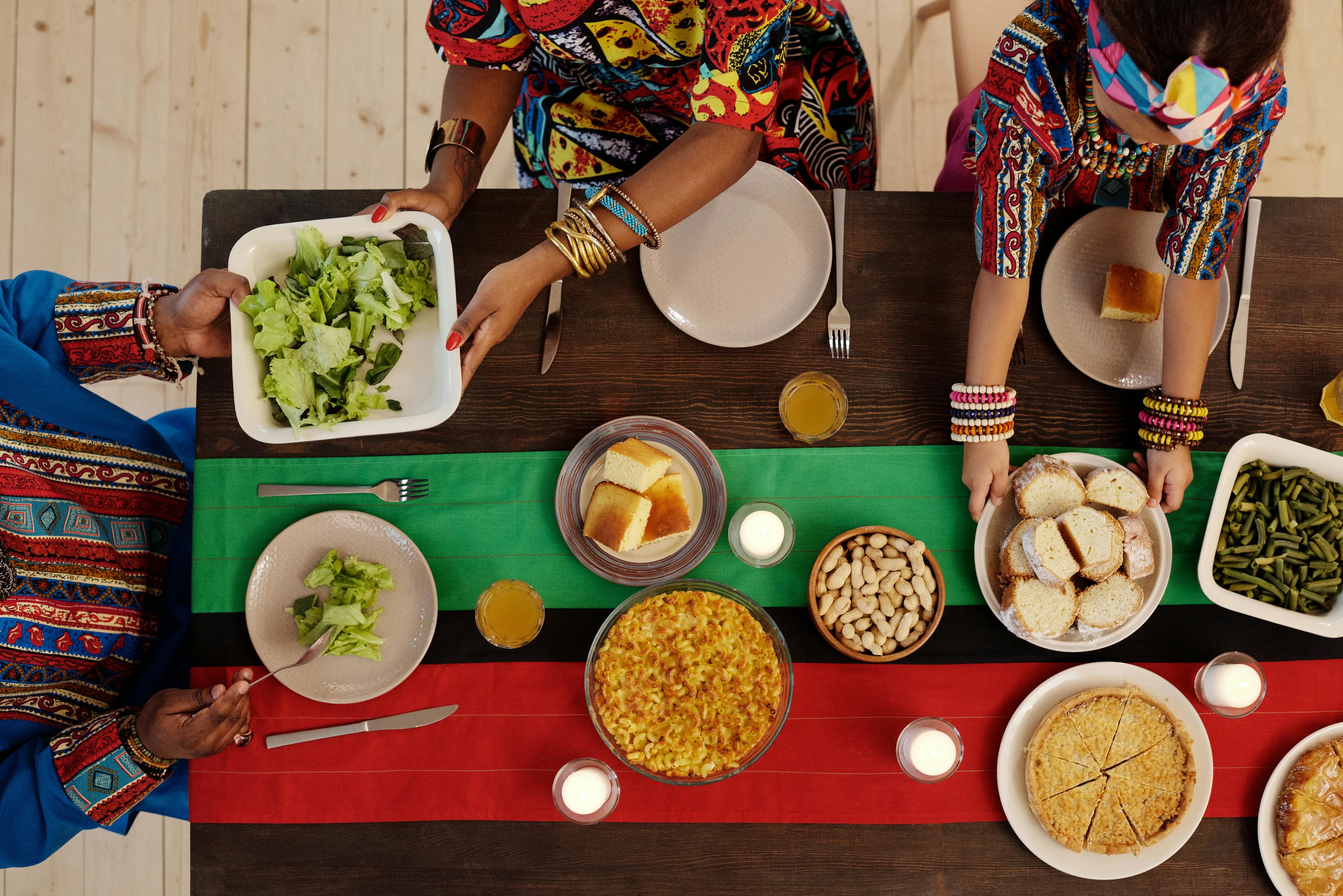
Trend lines, data, and information described in this article emerge from the ongoing analysis performed by Nextatlas on its global observation pool made of innovators, early adopters, industry insiders expressing their views on Twitter, Instagram, and Reddit.
To learn more about our AI, discover Nextatlas Methodology here
Related articles:

AWARDS & NOMINATIONS
Nextatlas Named Finalist for the ISG EMEA Software Innovation Awards 2025
Italy
Torino - Via Stampatori 4, 10122(Operational headquarter)+39 011/0864065VAT number and registration number at the Registro delle Imprese di Cagliari: 03428550929 paid share capital € 167.740,00 — © 2024 iCoolhunt SpA.



